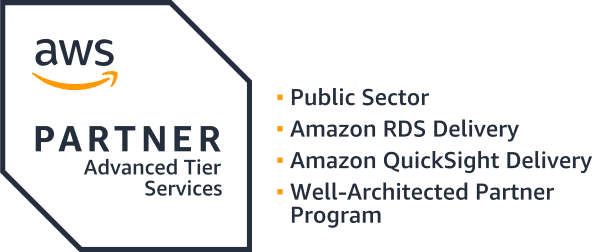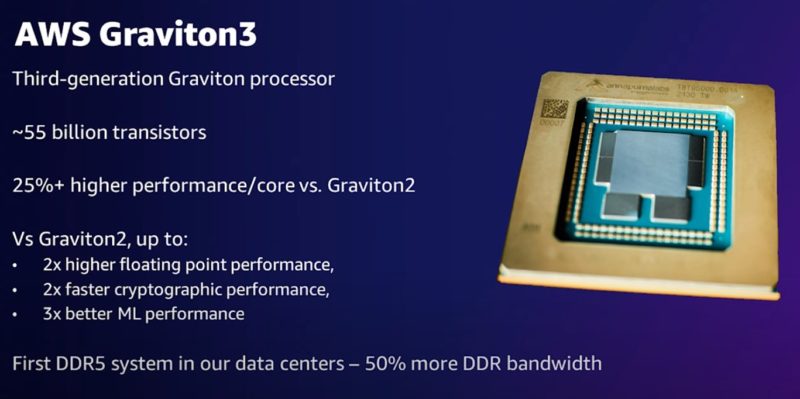What Role does AWS Graviton Fill?
Amazon wanted an in-house processor solution that did not require them to depend on Intel and AMD for innovations and upgrades. Graviton was implemented to both streamline and reduce the costs of operating EC2 instances. By implementing Arm architecture processors, customers have more options for the EC2 instances they can use and can use Arm-based applications like web servers. Even with increased options, Graviton still provides high availability and security while reducing the cost of virtualization. Customers can generally expect server stability and lower prices as a result of Arm-based architecture.
The initial reception to the first generation of AWS Graviton processors weren’t as well-rounded as the offerings from AMD and Intel processors during their initial release. However, Amazon did gradually roll out X86-based processors to better compete with AMD and Intel’s offerings. The biggest difference is Arm-based processors’ lower power consumption that results in its better price performance. To take advantage of Arm architecture, Amazon announced the implementation of AWS Graviton2 in mid-2020 to better tolerate more demanding workloads.
As an advanced AWS partner, we bring unparalleled expertise to architect, deploy, and optimize cloud solutions tailored to your unique needs.
Differences Between Graviton and Graviton2
Amazon launched Graviton2, advertising the new processors’ capability to achieve up to 40% price performance compared to its X86 processor counterparts, with up to seven times the performance of the first generation of Graviton processors. The new processors also come with modifications, such as quad core, memory that’s five times the capacity of first generation cores, and caches that are double first generation cores. For security, Graviton uses 256-bit DRAM encryption methods that are always active on Graviton2 instances. Graviton2 offers several critical improvements to make better cloud-native apps that work securely and at scale.
Storage
First-generation Graviton offers simple storage that’s useful for hosting web services, such as images, videos, and analytical data. This is good for data storage services that provide better remote access. By comparison, Graviton2 uses block-level storage that can store files at multiple values. Blocks better protect data by preventing easy access via a remote device and internet connection. These features are better for business continuity, NoSQL databases, and software testing.
Information Accessibility
Data in first-generation processors are stored in an unclustered format, so access is easier. They need only an HTTP protocol. By comparison, Graviton2 requires an attached connection for access.
Availability
AWS Graviton is available through the internet by using API. Graviton2 is available only through the single instance attached to the processor.
Durability
Graviton still offers durability by allowing data storage in multiple availability zones, while second-generation processors only allow data storage in one.
Services that Use Graviton Instances
Amazon EC2
Elastic Cloud Computing is the most common service for virtual servers and application functionality.
Amazon ElastiCache
ElastiCache can use Graviton instances to accelerate data retrieval and processing.
Amazon Elastic Kuberenetes Services (EKS)
EKS is already popular for running multiple containers in parallel, but Graviton could help run those workloads more efficiently.
Amazon Aurora
The relational databases Aurora offers offer great performance and can quickly sort through uncategorized data swiftly. Aurora is even compatible with MySQL and PostgreSQL. Integrating an Aurora database with a Graviton instance could help the database tolerate larger datasets.
Amazon Relational Database Service (RDS)
RDS is designed more for the maintenance and operation of multiple databases in the cloud, automating processes such as scaling and creating or updating backups.
AWS Lambda
Lambda is a serverless service that runs segments of user-provided code in response to established events.
Benefits of Graviton
Cost-effective
As established, Graviton’s processors use Arm architecture to provide lower costs, latency, and improved cloud benefits such as scalability, availability, and security.
Eco-system Compatibility
The available processors can be used across different system types. Graviton and Graviton2 are based on 64-bit Arm neoverse core architecture, which means several popular Linux-based operating systems, including Amazon Linux 2, SUSE, and Red Hat, can support this type of architecture.
Good CPU Performance
AWS reports Graviton processors have up to 3.45% better performance than traditional architecture processors. Also, utilizing Graviton processors is comparatively more simple than typical X86 processors.
Multi-purpose
Graviton cores can vastly improve efficiency for however they’re implemented into servers, from micro-services to cluster computing.
Computing-intensive applications
Graviton processors can tolerate infamously processing-heavy workloads, like HD video processing and CPU-based machine learning algorithms.
Stable connection
This service does support C6gn networks at 100 Gbps.
Stable connection
This service does support C6gn networks at 100 Gbps.
Generation of Graviton Instances
Get Started Today!
At AllCode, our mission is to leverage our unique skillset and expertise to deliver innovative, top-tier software solutions that empower businesses to thrive in our world’s rapidly-evolving technological landscape.
Work with an expert. Work with AllCode



